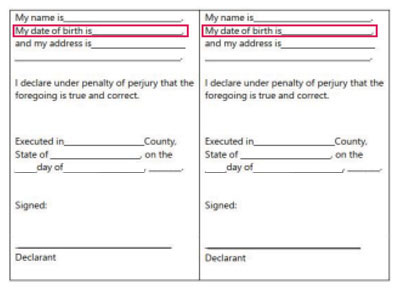Hey guys does anyone know or if the new Residential real Property declaration needs to be notarized? It has similar language to a Jurat, but I’m not sure, so I’m asking the pros, what say you, It’s in a Refi/modification pkg from Amrock… ohhh I know I should ask them what they want!
Good morning, yes you should notarize the one with the jurat. In the future I suggest, if looks like a duck and quacks like a duck. It’s a duck. I hope this helps.
The T-47 Residentail Real Property Affidavit is specific to Texas. Every one of the T-47s I’ve run across in California have required notarization.
For those unfamiliar with a T-47, here’s a reference: https://www.texasrealestatesource.com/blog/texas-t-47-residential-real-property-affidavit/
Just looked at the form and yes, absolutely, it gets notarized. It contains a notarial certificate. I WOULD strongly advise you make sure it is TX compliant as I notice in the form I saw there is no venue.
Gold luck
I ask the hiring party, Rocket Mortgage…he asked if there was a notary signature line, and it is not…he said then don’t notarize it! My take on it, is to always ask the hiring party… get it from the horse’s mouth, instead of some random answer from the internet chat group that may have several different answers that vary from state to state! Thanks y’all!! Happy New Year!!
I’m not a Texas notary. I have relatives there and have inherited property there. I found an explanation from Texas National Title that says the T47.1 does not need to be notarized, but one could also use a T47 which does require notarization. In either case the statement is made under penalty of perjury.
The T47.1 form itself looks to my eye like a non-notarized declaration under penalty of perjury.
The T-47.1 is a declaration, that mirrors the content of the T-47, but does not require an actual notary. It is important to note that it is still made under penalty of perjury and the declarant states in the form that they understand that any person intentionally making a false statement may be liable for actual and/or punitive damages.
I just read that too!!! thanks guys
You’re absolutely correct, slcaldwell201. The T-47.1 Declaration is not notarized; whereas, the T-47 Affidavit is notarized.
@slcaldwell201 Concur ![]() percent! Always better to be SAFE, than to be sorry . . .
percent! Always better to be SAFE, than to be sorry . . .
As there’s a Venue on the form you shared, it certainly would give one cause for pause!
Glad you followed your best judgment by reaching out to the hiring entity!
======
I’m certain you’re already cognizant that it’s vital to your success to follow these guidelines in this order:
- First & foremost - Honor the statues & regulations of your State.
- Memorize the Notary Handbook of your State to ensure you fully comprehend the requirements, insights, & rules as well as how to implement and/or apply them.
- Review in-detail the Signing Order [SO] instructions that guide you to achieving a successful signing appointment while adhering to the statues & regulations of your State & the Notary Handbook of your State as the PRIMARY guideline when providing professional services.
![]()
And in addition to knowing/memorizing the handbook, the new additions and supplemental docs that they may come up with, will always keep us on our toes with staying up to date with new rules & regulations! Thanks for everyone’s input…each victory helps some other to win!
I found this insightful,as I think states may want to add an extra layer of protection for all parties. Thank you
I would do with one being notarized and one without being notarized just to be covered. I do this when Im not sure just to keep from going back if it isn’t right.
If the document is the borrower declaring their intended use – whether they are using the property as primary residence, then yes of course I would notarize their signed statement. The interest rate they get for primary residence is going to be different (lower/better) compared to secondary residences and vacation rentals. The idea from the bank’s point of view is there is less risk, if the borrower is going to be living in the home as a primary residence.
So… if we are at a signing if the borrowers are signing their statement declaring that it is a primary residence and you perform the notarization and then 2 seconds later you hear the borrowers talking to each other (or directly to you) how they are actually going to use this property as a nightly rental, then that is ![]() FRAUD
FRAUD ![]() and we are obligated to stop and report it to our hiring company (and note in our journal).
and we are obligated to stop and report it to our hiring company (and note in our journal).
Notary Signing Agent Document FAQ: Occupancy Affidavits | NNA.
The T-47.1 is a declaration, that mirrors the content of the T-47, but does not require an actual notary. It is important to note that it is still made under penalty of perjury and the declarant states in the form that they understand that any person intentionally making a false statement may be liable for actual and/or punitive damages.
This topic was automatically closed 90 days after the last reply. New replies are no longer allowed.

